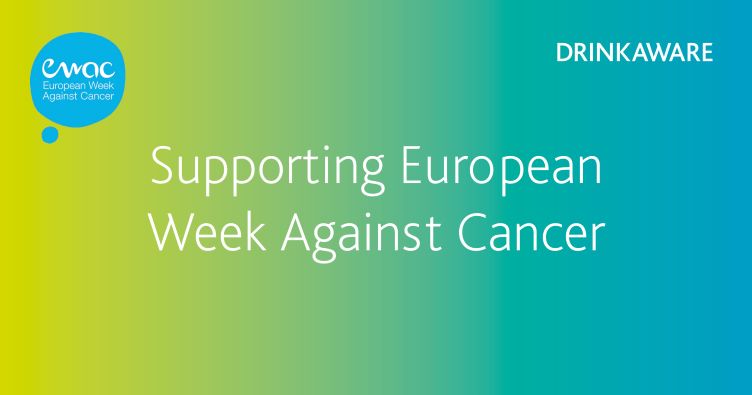Alcohol is known as a modifiable risk factor for at least seven types of cancer. This means it is a risk factor we can do something about. While there are many different contributory factors for cancer, there are some positive actions we can take to reduce our own and our family’s cancer risk. This means that by making small changes to our drinking habits, we can help to lower the cancer risk. The HSE advise that the risk of developing these alcohol-related cancers is smaller for people who drink within the weekly low-risk alcohol guidelines.
The European Week Against Cancer runs each year from 25 to 31 May, to encourage all of Europe to use this time period to increase communication on the issues closest to their hearts, and to reflect on and to take action to achieve a Europe Free of Cancer.
If you would like to know more, the World Cancer Research Fund website has detailed information on the research evidence relating to alcohol and cancer risk.
EUROPEAN CODE AGAINST CANCER
The European Code Against Cancer was developed by the World Health Organisation’s International Agency for Research on Cancer (IARC) in 2014. The code was prepared by cancer specialists, scientists and other experts to increase the awareness of European citizens about efficient ways to prevent cancer.
The code lists 12 ways of helping people to adopt healthier lifestyles and of boosting cancer prevention, including drinking less alcohol. The WHO estimates that about one half of all cancers could be avoided if everyone followed all the recommendations in the code.
- Do not smoke or use tobacco products.
- Make your home and workplace smoke free.
- Take action to be a healthy body weight.
- Be physically active in everyday life.
- Have a healthy diet.
- If you drink alcohol of any type, limit your intake. Not drinking alcohol is better for cancer prevention.
- Avoid too much sun, especially for children. Use sun protection.
- Protect yourself against cancer-causing substances by following health and safety instructions in workplace.
- Reduce exposure to radiation in your home through naturally occurring radon. Visit epa.ie
- Advice for women:
- Breastfeeding reduces the mother’s cancer risk. If you can, breastfeed your baby.
- Hormone replacement therapy (HRT) increases the risk of certain cancers. Limit use of HRT.
- Ensure your children take part in vaccination programmes for:
- Hepatitis B (for newborns)
- Human papillomavirus (HPV) (for girls).
- Get screened for cancer. Visit cancerscreening.ie
KNOW YOUR DRINKING
Are you drinking within the HSE weekly low-risk alcohol guidelines? The Drinkaware Index found that just 2% of Irish adults can correctly identify the guidelines, but they are important to know and can help you to see how much you are really drinking over the week. Remember, these are guidelines – not a target.
- 11 standard drinks (110g pure alcohol) spread out over the week for women, with at least two alcohol-free days
- 17 standard drinks (170g pure alcohol) spread out over the week for men, with at least two alcohol-free days
Common examples of one standard drink are a half pint of lager/stout/cider, a 100ml glass of wine or pub measure (35.5ml) of spirits. On average, it takes one hour for the body to process one standard drink and there’s no quick fix – only time.
Order a free standard drink measure cup to keep track at home
MAKE SMALL CHANGES TO DRINK LESS
Stuck for ideas? Here are some small steps you could take to drink less alcohol. Remember, everyone’s motivation for drinking less is different so it’s important to choose small steps that work for you.
- Stay out of rounds – you may end up drinking far more than you intended as you are more likely to drink at the pace of the fastest person in the group.
- Always use a standard drink measure: never free-pour spirits or wine. Order one now
- Set yourself a limit on a night out. If you usually go for an after-work drink on a Friday, why not set a limit on the number of drinks you will have in advance? Keeping this number in mind will help you to keep track and stick to it.
- Use a smaller glass. This might sound obvious but the smaller your glass, the less alcohol you can pour in it. For example, wine glasses have increased in size
- Alternate each drink with a glass of water to reduce the dehydration associated with alcohol. Keep a jug of water on the table to make this easier.
- Never top up your wine glass – always finish one glass before refilling. Topping up your glass makes it harder to track how much you’re drinking.
- Take advantage of the increasingly available lower or no-alcohol beer or wine and swap out your usual drink.
- Break your habits at home. This can seem like a nice way to unwind after a long day but it can often result in drinking more than usual. If your normal night in includes a drink in front of the TV, consider doing something different like going for a walk or try not to keep alcohol in the house.
- If you would like to stop drinking completely, we have some advice to help.


